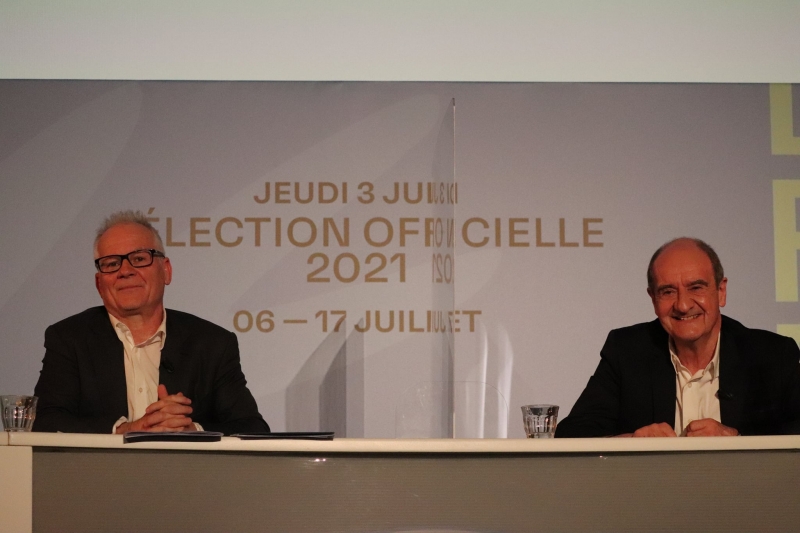|
|
||
|
Pro Tools
FILMFESTIVALS | 24/7 world wide coverageWelcome ! Enjoy the best of both worlds: Film & Festival News, exploring the best of the film festivals community. Launched in 1995, relentlessly connecting films to festivals, documenting and promoting festivals worldwide. Working on an upgrade soon. For collaboration, editorial contributions, or publicity, please send us an email here. User login |
Over 150 Video-On-Demand Services Being Utilized in EuropeFor the event of the Cannes International Film Market, the European Audiovisual Observatory and the French Directorate for the Development is presenting a study of the video-on-demand usage within 24 European countries. This study is being completed by NPA Conseil. As stated in the Press Release in Strasbourg: "The study analyses the various technical methods used for video-on-demand, the various economic models applied, the debate on regulation, and the place of video-on-demand in the cinematographic and audiovisual industry. A detailed analysis of about 150 services operational in 24 countries is provided." "At the end of 2006, 142 pay services (excluding services devoted exclusively to music and services comprising solely programmes for adults) were operational in the 24 countries studied. If one adds to this the number of free access services, those which were set up at the beginning of 2007, and those which exist in countries not covered by the study, the number of services currently operational in Europe may be estimated as being more than 150. France, the Netherlands and the United Kingdom stand out as leaders in terms of the number of services on offer. Most of the services in Europe (94) can be accessed via the Internet and can therefore be viewed on a computer screen. Transmission using the broadband network, usually as part of an offer for the distribution of television channels in IPTV mode, constitutes the second most frequently used mode of distribution (47 services). In this case the programmes can be viewed on a television screen. As digital broadcasting by satellite and by terrestrial network does not permit a return pass, offers of video-on-demand are possible by storing the programmes on the user's digital recorder (PVR). The number of services of this type is still limited in Europe, but they are offered by two of the main digital television content aggregators (BSkyB's Sky Anytime service in the United Kingdom and Ireland and Premiere's Direkt Premiere + in Germany and Austria)." As reported at the end of 2006, France ranked the highest in using pay services - a total of 20 - followed by the Netherlands with 19 and the United Kingdom with 13. These services exclude free services, video clip services, and services for adults. There are 3 key playes within this video-on-demand industry. They include: "The editors of television channels [whom] generally supply catch-up TV services, which make it possible to watch a programme after it has been broadcast on television. Many broadcasters, however, take advantage of their position in the rights market to offer films as well. [Second:] Content aggregators, companies that have the ability to constitute catalogues of rights for works likely to be distributed via VoD. This category may also include video editors, societies for the collective management of copyright (such as the SGAE and the EGEDA in Spain), bodies or companies that manage archives (the Institut national de l'audiovisuel in France, the Norwegian Film Institute, British Pathe, etc) and commercial retail companies (chains such as FNAC and Virgin, companies specialising in DVD rental such as Lovefilm, Glowria, etc). Some companies have been set up specifically with the aim of becoming content aggregators. In the Netherlands, no fewer than nine services are organised on the basis of the catalogue put together by the aggregator ODMedia. [Third:] Telecom operators (incumbent operators, Internet access providers, cable operators) are newcomers on the market for the distribution of content. They are the most active of the players, and are innovative in terms of diversity of offer (particularly by using cross-media partnerships). "Less importantly, a number of production companies or associations of producers also edit services. The main cinematographic groups in Europe have not yet announced their own services, in contrast to the situation in the United States where the Hollywood majors are the origin of the Movielink service. One should nevertheless note the involvement of the Svensk Filmindustri group in the SF-Anytime service which can be accessed in the various Scandinavian countries. In Europe, the American majors are collaborating with the main national VoD services, mainly in the context of non-exclusive agreements, although Warner has joined forces with Arveto (Bertelsmann group) to launch the Film2Home service in German-speaking countries. "There are several arrangements for rental: payment for each item separately (the rental charge is paid for each individual item, at prices that range, in general, from €1.50 to €6.00), the pack, the pass, and subscription (often called SVoD - Subscription VoD). In this last case, the payment is valid for a set of programmes that are available for unlimited viewing during a given period of time. The programme rented can, in most cases, be viewed for a period of time of between 24 and 48 hours. "Payment here is also made for each item separately, at a price that is generally between €5.00 and €15.00. The programme can be viewed and stored on a PC; it cannot usually be transferred to a DVD player connected to a television set (because of the types of encryption used). A "purchase to burn" option that allows the downloaded programme to be burned onto a DVD (sometimes in a limited number of copies) may also be available, in which case prices are between €15.00 and €20.00. "FOD (Free On Demand) is most frequently used for viewing audiovisual programmes as catch-up TV (i.e. programmes offered by VoD services for a limited amount of time after broadcasting by the television channel). "There are two types of FoD - programmes for which no charge is made that are financed by advertising (mostly television series and fiction), and programmes which involve no money changing hands. The latter type is used either for promotional purposes, or for testing the potential of a free model in order to have a better basis for subsequent negotiation with advertisers. "Although payment for each individual item separately has historically been the main method used for making content available on demand, there are now several marketing schemes in keeping with current developments - the constitution of packs, subscription offers (SVoD - "Subscription VoD"), passes giving entitlement to unlimited viewing of all or part of an available catalogue, and third-party financing (whether cross-subsidies between ranges of an operator's products or contributions from advertising). "Study of the catalogues for VoD services in Europe shows that films represent more than half the titles on offer against payment. "As for the breakdown between new releases and stock titles, the information communicated by the operators is not sufficiently precise to be able to establish consolidated figures. Observation of the various services nevertheless shows that new releases represent between 3 and 25% of the cinema titles, depending on the service. "In those countries where there is a specific window for vthe release of films in VoD, usually laid down as part of interprofessional agreements, these agreements are, in most cases, being renegotiated, with a clear tendency towards the windows becoming smaller. VoD release on the same day as DVD release (the "day-to-date" system current in the United States) is becoming more frequent, mainly in the Scandinavian countries. "The study highlights the need for greater transparency on the part of operators. In a context of investment and serious competition, they are relatively unwilling to release figures that would demonstrate the development of the market and the success of the works proposed in their catalogues. Greater transparency should be a positive factor, creating confidence on the part of both consumers and rightsholders in respect of this new method for circulating their work." For the event of the Cannes International Film Market, the European Audiovisual Observatory and the French Directorate for the Development is presenting a study of the video-on-demand usage within 24 European countries. This study is being completed by NPA Conseil. As stated in the Press Release in Strasbourg: "The study analyses the various technical methods used for video-on-demand, the various economic models applied, the debate on regulation, and the place of video-on-demand in the cinematographic and audiovisual industry. A detailed analysis of about 150 services operational in 24 countries is provided." "At the end of 2006, 142 pay services (excluding services devoted exclusively to music and services comprising solely programmes for adults) were operational in the 24 countries studied. If one adds to this the number of free access services, those which were set up at the beginning of 2007, and those which exist in countries not covered by the study, the number of services currently operational in Europe may be estimated as being more than 150. France, the Netherlands and the United Kingdom stand out as leaders in terms of the number of services on offer. Most of the services in Europe (94) can be accessed via the Internet and can therefore be viewed on a computer screen. Transmission using the broadband network, usually as part of an offer for the distribution of television channels in IPTV mode, constitutes the second most frequently used mode of distribution (47 services). In this case the programmes can be viewed on a television screen. As digital broadcasting by satellite and by terrestrial network does not permit a return pass, offers of video-on-demand are possible by storing the programmes on the user's digital recorder (PVR). The number of services of this type is still limited in Europe, but they are offered by two of the main digital television content aggregators (BSkyB's Sky Anytime service in the United Kingdom and Ireland and Premiere's Direkt Premiere + in Germany and Austria)." As reported at the end of 2006, France ranked the highest in using pay services - a total of 20 - followed by the Netherlands with 19 and the United Kingdom with 13. These services exclude free services, video clip services, and services for adults. There are 3 key playes within this video-on-demand industry. They include: "The editors of television channels [whom] generally supply catch-up TV services, which make it possible to watch a programme after it has been broadcast on television. Many broadcasters, however, take advantage of their position in the rights market to offer films as well. [Second:] Content aggregators, companies that have the ability to constitute catalogues of rights for works likely to be distributed via VoD. This category may also include video editors, societies for the collective management of copyright (such as the SGAE and the EGEDA in Spain), bodies or companies that manage archives (the Institut national de l'audiovisuel in France, the Norwegian Film Institute, British Pathe, etc) and commercial retail companies (chains such as FNAC and Virgin, companies specialising in DVD rental such as Lovefilm, Glowria, etc). Some companies have been set up specifically with the aim of becoming content aggregators. In the Netherlands, no fewer than nine services are organised on the basis of the catalogue put together by the aggregator ODMedia. [Third:] Telecom operators (incumbent operators, Internet access providers, cable operators) are newcomers on the market for the distribution of content. They are the most active of the players, and are innovative in terms of diversity of offer (particularly by using cross-media partnerships). "Less importantly, a number of production companies or associations of producers also edit services. The main cinematographic groups in Europe have not yet announced their own services, in contrast to the situation in the United States where the Hollywood majors are the origin of the Movielink service. One should nevertheless note the involvement of the Svensk Filmindustri group in the SF-Anytime service which can be accessed in the various Scandinavian countries. In Europe, the American majors are collaborating with the main national VoD services, mainly in the context of non-exclusive agreements, although Warner has joined forces with Arveto (Bertelsmann group) to launch the Film2Home service in German-speaking countries. "There are several arrangements for rental: payment for each item separately (the rental charge is paid for each individual item, at prices that range, in general, from €1.50 to €6.00), the pack, the pass, and subscription (often called SVoD - Subscription VoD). In this last case, the payment is valid for a set of programmes that are available for unlimited viewing during a given period of time. The programme rented can, in most cases, be viewed for a period of time of between 24 and 48 hours. "Payment here is also made for each item separately, at a price that is generally between €5.00 and €15.00. The programme can be viewed and stored on a PC; it cannot usually be transferred to a DVD player connected to a television set (because of the types of encryption used). A "purchase to burn" option that allows the downloaded programme to be burned onto a DVD (sometimes in a limited number of copies) may also be available, in which case prices are between €15.00 and €20.00. "FOD (Free On Demand) is most frequently used for viewing audiovisual programmes as catch-up TV (i.e. programmes offered by VoD services for a limited amount of time after broadcasting by the television channel). "There are two types of FoD - programmes for which no charge is made that are financed by advertising (mostly television series and fiction), and programmes which involve no money changing hands. The latter type is used either for promotional purposes, or for testing the potential of a free model in order to have a better basis for subsequent negotiation with advertisers. "Although payment for each individual item separately has historically been the main method used for making content available on demand, there are now several marketing schemes in keeping with current developments - the constitution of packs, subscription offers (SVoD - "Subscription VoD"), passes giving entitlement to unlimited viewing of all or part of an available catalogue, and third-party financing (whether cross-subsidies between ranges of an operator's products or contributions from advertising). "Study of the catalogues for VoD services in Europe shows that films represent more than half the titles on offer against payment. "As for the breakdown between new releases and stock titles, the information communicated by the operators is not sufficiently precise to be able to establish consolidated figures. Observation of the various services nevertheless shows that new releases represent between 3 and 25% of the cinema titles, depending on the service. "In those countries where there is a specific window for vthe release of films in VoD, usually laid down as part of interprofessional agreements, these agreements are, in most cases, being renegotiated, with a clear tendency towards the windows becoming smaller. VoD release on the same day as DVD release (the "day-to-date" system current in the United States) is becoming more frequent, mainly in the Scandinavian countries. "The study highlights the need for greater transparency on the part of operators. In a context of investment and serious competition, they are relatively unwilling to release figures that would demonstrate the development of the market and the success of the works proposed in their catalogues. Greater transparency should be a positive factor, creating confidence on the part of both consumers and rightsholders in respect of this new method for circulating their work." 22.05.2007 | Cannes's blog Cat. : BSkyB Cannes Entertainment Entertainment Europe FNAC France French Directorate Germany Glowria Internet broadcasting Internet television IPTV Ireland Lovefilm Netherlands retail Sky Anytime Strasbourg Streaming Technology Technology Television Television in the United Kingdom Terminology the Cannes United Kingdom United States Video Video on demand Virgin Warner Interviews
|
LinksThe Bulletin Board > The Bulletin Board Blog Following News Interview with EFM (Berlin) Director
Interview with IFTA Chairman (AFM)
Interview with Cannes Marche du Film Director
Filmfestivals.com dailies live coverage from > Live from India
Useful links for the indies: > Big files transfer
+ SUBSCRIBE to the weekly Newsletter Deals+ Special offers and discounts from filmfestivals.com Selected fun offers
> Bonus Casino
User imagesAbout CannesMy festivalThe EditorUser contributions |

























 Cannes
Cannes 


